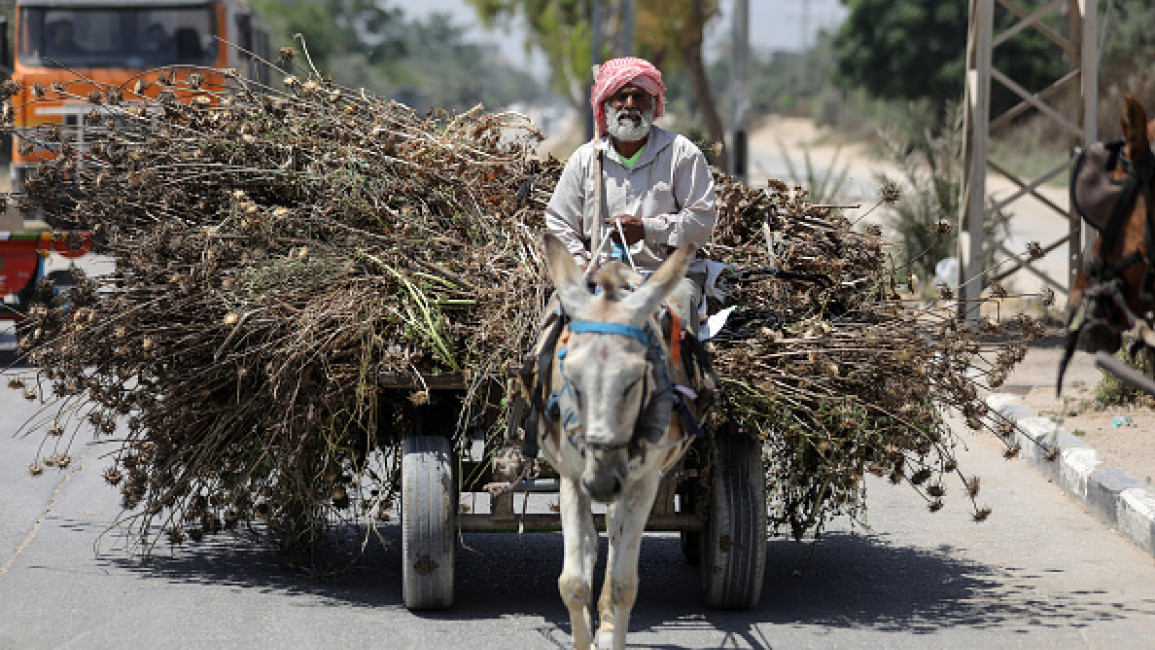New wave of price increases hits besieged Gaza Strip
A new wave of high prices recently hit the impoverished and besieged coastal enclave of the Gaza Strip, which is under a 15-year Israeli blockade.
Cooking gas, flour, sugar, rice, wheat, chicken, vegetables and fruits, as well as all goods imported from the West Bank, are among the commodities that have witnessed a significant increase in prices.
"Unfortunately, the things in Gaza got out of control as a result of the consequences of the Russia-Ukraine conflict that resulted in increasing prices in most of the goods and food commodities around the world," Osama Nofal, an official at the Hamas-run economy ministry, told The New Arab.
The official said that the wheat stock exchange increased by 65% from the beginning of the crisis until the present time, and today the price of a ton of wheat is marked at $US434 compared to $US237 prior to the crisis.
The official further added that the repercussions of the Russian-Ukrainian war were not only confined to only wheat but also affected most aspects of life as a result of the suspension of navigation and aviation from both municipalities.
Such unexpected circumstances have "aggravated the situation in the Gaza Strip from bad to worse," the official said.
In a bid to offset further deterioration, the ministry adopted a strategic economic plan. However, Nofal noted, the Fatah-led Palestinian Authority "thwarted the plan after depriving Gaza importers of exemptions for the added tax approved by the Authority."
"Now, most Gazans depended on flour distributed by the United Nations Relief and Works Agency (UNRWA), which somewhat contributes to maintaining the food security of the population," he added.
Speaking to The New Arab, Abdel Nasser Al-Ajrami, head of the Bakeries Owners Association in Gaza, said, "Wheat prices jumped crazy, as the price of a ton rose from US$360 to US$550 after the Russian-Ukrainian war, and this rise and these changes quickly affected the bakery market."
However, al-Ajrami added, the residents in Gaza could have been protected from this "crazy rise" if "the Fatah and Hamas governments agreed to raise the value of taxes on flour and wheat at the Israeli crossings."
What made matters worse is that the prices of petroleum products also rose without warning, with the price of diesel reaching US$1.85 compared to US$1.69 previously, and the price of gasoline reached US$2.05 compared to US$1.99 previously. Meanwhile, 12 kilograms of cooking gas rose to US$21.21 from US$20.
Hamas blames rising food prices in Gaza on global trend after complaints from Palestinians in the besieged coastal enclave 👇https://t.co/myDfF1a1jp — The New Arab (@The_NewArab) October 26, 2021
Mohammed Al-Hato, a driver from Gaza, expressed his anger at the sudden increase in prices when locals can barely meet the minimum requirements to survive daily needs.
"I work about 16 hours a day so that I can earn about US$20 (...) with great difficulty I can support my family. Currently, I will not be able to provide the price of diesel for the car I work on, especially since the majority of customers will refrain from paying more money," Al-Hato told The New Arab.
"I do not know how we will be able to deal with these difficult circumstances," he added, noting that he might be forced to leave his job and become unemployed, which will threaten the stability of his family.
Raed Abu Assad, a farmer from Deir al-Balah in the central Gaza Strip, said he would suffer heavy losses if he was not able to quickly sell the vegetables and fruits he grows due to the high fuel prices.
"The rise in fuel has significantly and negatively affected our work, especially since we rely heavily on electric motors to irrigate agriculture, in addition to transporting vegetables and fruits to markets via trucks (...), which means that this will cause the prices of vegetables and fruits to rise," the 47-year-old father of seven told The New Arab.
"The resident who suffers from poverty cannot bear the burdens of a new high cost of living, as they are hardly able to obtain the minimum requirements of life necessary for them," he said.
Al-Hato and Abu Assad blamed the Hamas government for the deteriorating situation in the besieged Gaza Strip, accusing it of not having an "economic rescue plan that would protect citizens from the consequences of a global economic crisis."
Palestinians in #Gaza Strip hit by surging food, fuel prices amid devastating Israeli siege - https://t.co/4Bzh8qIbhL on @The_NewArab #Palestine pic.twitter.com/Bf2nD2wTV1 — al whit🍉 (@soitiz) March 7, 2022
Moeen Rajab, a Gaza-based economic expert, believes that the residents in Gaza are victims of sudden decisions to raise prices issued by the authorities often made without appropriate consultation with the people.
"The Hamas-run government must prepare citizens three months before the decision to raise prices, give them an opportunity to find alternative solutions, and not shock them with sudden decisions that may have devastating effects," he told The New Arab.
Rajab called on the local authorities to not adopt the new prices without studying the repercussions before they are officially approved, as citizens are clearly unable to afford the new high prices.
Salama Maarouf, Head of the Government Media Office in Gaza, said that a government committee was formed to put an end to the impact of the high prices, which took several measures, whether through tax exemption for basic commodities or the issue of price control and other series of reductions to support the local product in the Gaza Strip.



